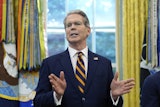Access to China for American businesses was the topic of a half-day conference yesterday entitled “China: The Land of Opportunity for American Businesses” at the Christos M. Cotsakos College of Business at William Paterson University in Wayne, NJ.
Dr. C.K. Leung, Interim Dean of the College of Business, began the conference with some opening remarks, emphasizing China as a growing market for American businesses. “We need more understanding between these two countries,” remarked Leung.
The first speaker was David Dempsey, Managing Director, Bentley Associates, focusing on how to best invest in China. “There is exponential growth in China,” Dempsey said. “Productivity accounts for a large portion of their economy growth.”
Dempsey identified several issues as points of concern when looking to invest in China, such as the environmental problems, misallocation of funds and lack of financing sources available. Additionally, Chinese banks tend to make lending decisions based on political criteria instead of credit. “But good companies are somehow finding financing,” Dempsey said.
When considering investment possibilities in China, “the compelling opportunity for low cost manufacturing has attracted overseas entrepreneurs and joint ventures for large scale production and efficient delivery,” Dempsey said.
There are plenty of risks and rewards, according to Dempsey. The rewards include access to a huge market, good long-term opportunities and exceptional growth. The risks, however, include understanding the approval processes of the government, intellectual property issues and local and Provincial bureaucracy. “The solutions to the risks are to spend time with local and Provincial leaders to build confidence, as well as spend time with law firms, accounting firms in the area,” according to Dempsey.
The second speaker was Monica Chen, Director of the Hong Kong Economics and Trade Office in New York, NY, discussing Hong Kong as Asia’s World City. Chen spoke of Kong Kong’s simple tax system and access to half the world’s population within a five hour flight. “Hong Kong has been voted as the world’s freest economy for 12 consecutive years by the Heritage Foundation,” Chen said.
Chen highlighted the CEPA, China’s free-trade agreement with Hong Kong. “The goal was to make regulatory procedures more user-friendly,” Chen said.
Chen also spoke about the Pan-Pearl River Delta Cooperation and Development Forum and its focus to develop infrastructure and establish an open marketplace.
The second part of the conference further explored the initial steps involved to access the Chinese market. Harvey Rubinstein, International Trade Specialist, U.S. Department of Commerce (DOC), stressed the importance of due diligence when entering a new international market. “It’s our job to get your landed, but you have to do your homework and learn about the market,” Rubinstein said.
Rubinstein cited multiple sources to start your research, including the U.S. DOC sites, https://www.trade.gov/export-solutions and https://www.buyusa.gov/.
Dr. Junyang Xi, Fullbright scholar from China visiting Brandeis University, discussed the recent banking reform taking place in China. According to Xi, the motivations for bank reform in China include the fear of financial crisis and the plan to strengthen competitiveness before the end of 2006. The steps to reform include strengthening regulations, raising the capital ratio, improving corporate governance and listing of banks in the stock market.
“The aim is to be Chinese banks listed on stock markets in order to improve capital access,” Xi said. “The achievements of bank reform are significant.”
According to Xi, China’s banking industry is moving in the right direction, but serious problems still exist. “A fully open bank system means easy access to services of preferred international banks.”
The final speaker at the conference was Ed Lee, Business Operations Manager, Xerox Corporation. Lee spoke of the quickly developing economy, mostly in the technology manufacturing sector. “China doesn’t want to be known just for low-cost manufacturing,” Lee said. “They would like to become a services center as well.”
Lee referred to China as a “growth engine” for companies and the high quality of the people in general. “It’s not just about cheap labor,” Lee said.



















